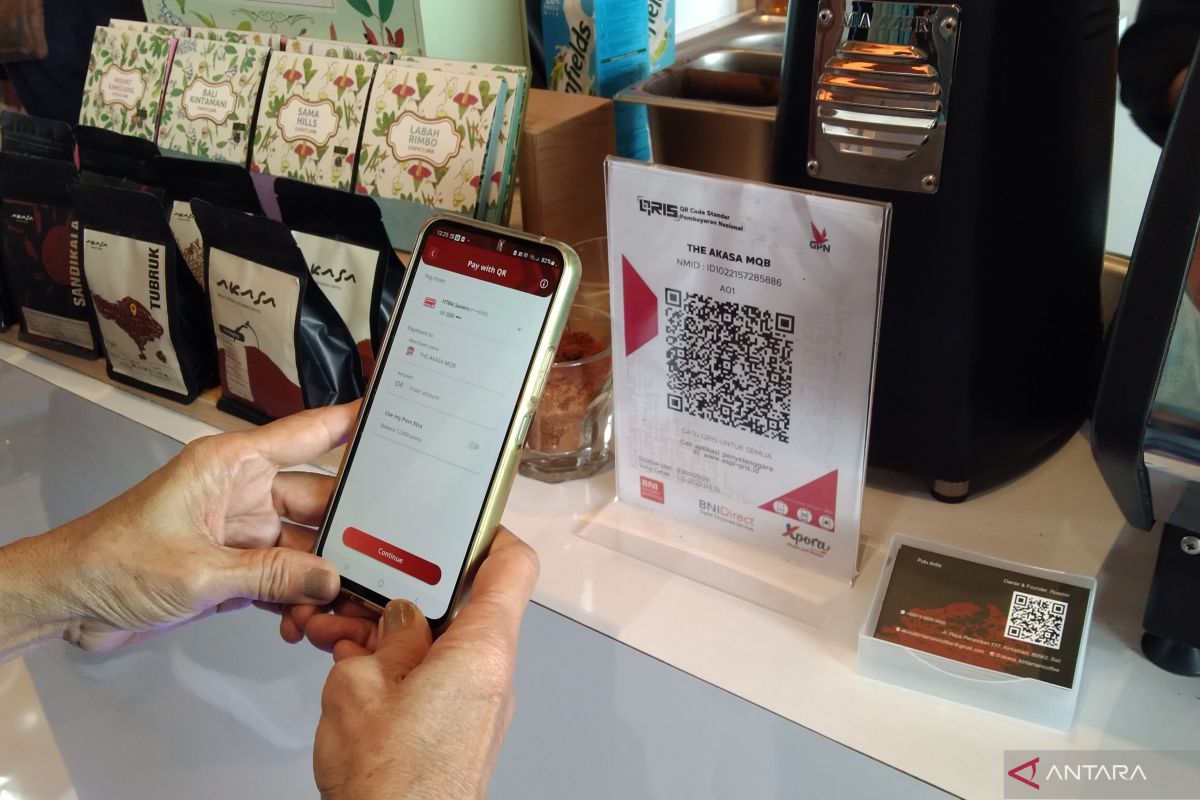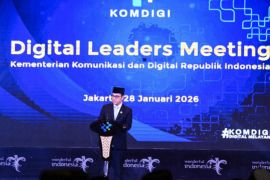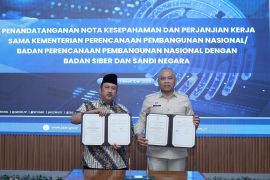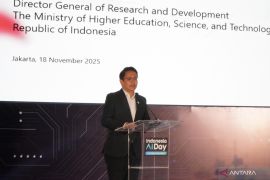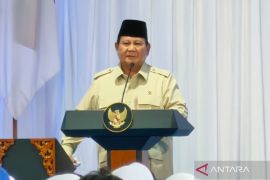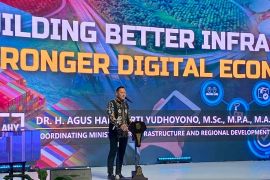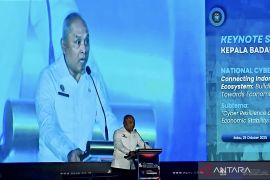In the last 10 years of President Joko Widodo's (Jokowi's) presidency, digital transformation has been expedited and has brought significant changes to many aspects of people's lives, including bureaucratic, public, and financial services.
With digitalization, public services and financial services have become increasingly fast, reliable, and easily accessible to the public as well as more transparent.
Digital transformation has also created new jobs in the technology sector, for instance, for software developers, data analysts, and data engineers.
In addition, the gig economy sector, which includes online motorcycle taxis, food delivery services, and freelance work, is also growing rapidly, providing jobs to millions of people.
The government's 2021–2024 Indonesia Digital Road Map to support digitalization consists of four main pillars: digital infrastructure, digital governance, digital economy, and digital society. Its focus is on achieving equal distribution of broadband networks, increasing 5G network penetration, and developing the next-generation connectivity technology ecosystem.
To expand people's access to the Internet, the government is accelerating the development of digital infrastructure, especially in remote areas. It is also encouraging the adoption of technology, increasing digital talents, and supporting regulations aimed at preparing a digital society.
With wider Internet coverage, businesses in regions can develop further with the help of online transactions.
As of December 2023, the Telecommunications and Information Accessibility Agency (BAKTI) of the Ministry of Communication and Informatics has built a total of 4,988 4G base transceiver stations (BTS) in underdeveloped, frontier, and outermost (3T) areas. The figure represents 96 percent of the total target of building 5,618 BTS in the 2021–2024 period.
According to the ministry's data, of the total 83,218 villages in Indonesia, 84.9 percent are now connected to the Internet.
The government is continuing to pursue the development of Internet infrastructure in 12,548 villages that lack Internet access through the laying of fiber optic networks.
Banking service digitalization
Commercial banks that previously focused on offline services have begun to innovate to improve services by utilizing online media, which has resulted in the birth of digital banking services.
Through digital banking services, administrative processes can be done online without requiring people to queue at bank branches. Ease of transactions and transaction authorization are attracting more people to digital banking services, especially those who are digitally literate.
Digital transformation has also driven fintech companies, especially those providing digital payment, peer-to-peer lending, and digital wallet services, to grow rapidly.
Financing disbursed through fintech peer-to-peer lending services reached Rp69.39 trillion (around US$4.45 billion) in July 2024.
Fintech has contributed to the improvement of financial inclusion in the country by allowing people to carry out financial transactions through digital platforms.
The government is creating regulations to support the development of fintech and e-commerce.
Bank Indonesia and the Financial Services Authority (OJK) are collaborating to issue regulations to ensure that the sector develops in a healthy and controlled manner, including through regulations on digital payment systems and user data protection.
However, the advancement of digitalization has been accompanied by the emergence of risks such as data breaches, fraud, and illegal online loans. Then there is the added threat of illegal investments or illegal financial activities.
Based on OJK data, 10,890 illegal financial entities were detected and blocked in the period from 2017 to July 31, 2024. The entities comprised 1,459 illegal investment entities, 9,180 illegal online lending/personal lending entities, and 251 illegal pawn shop entities.
Given the risk of personal data theft and bank account hacking, banks need to invest in the strengthening and development of innovation and digital technology.
Furthermore, financial literacy improvement efforts must be intensively implemented and targeted at all levels of society, including for students.
Such efforts can encourage people to be wiser in managing finances and access financing services for priority needs — not merely for consumptive purposes but for improving productivity — and to be responsible in paying off loans.
All parties are working together to accelerate financial literacy improvement and inclusion, including by building synergy through regional financial access acceleration teams (TPAKD), which involve ministries, agencies, financial services business players, academics, and other stakeholders.
As many as 1,732 financial education activities have been carried out by the OJK in collaboration with other stakeholders from January 1 to July 31, 2024, covering more than 3 million participants.
Banks and other financial services institutions also need to be more careful in providing financing to people to mitigate bad debt.
The case for going digital
The use of digital platforms makes it easier for micro, small, and medium enterprises (MSMEs) to carry out transactions, reduce costs, market products, and expand market access to consumers without being limited by space and time.
Thus, digitalization allows MSMEs to grow more and be more productive and innovative.
Indonesia currently has 64.19 million MSMEs, with micro and small enterprises accounting for 99.92 percent or 64.13 million of them.
Before the COVID-19 pandemic, around 9 million of the 64 million MSMEs had adopted digital technology. In 2023, the number increased to 27 million, in line with the acceleration of the digital transformation carried out by the government to bolster MSME capacity.
Various forms of support have been provided to MSMEs to help them go digital. They include the MSME Digital Market application or PaDi MSMEs.
The app created by the Ministry of State-Owned Enterprises (SOEs) brings together MSMEs and SOEs to optimize, accelerate, and encourage efficiencies in SOE spending on MSMEs, as well as expand and help MSMEs get access to financing.
The government is also providing support through the Digital Economy National Strategy. As per the 2020 President's Performance Report, the government allocated Rp4.2 trillion (around US$269.3 million) for the MSMEs Going Digital program.
The government also provided Online Single Submission (OSS) electronic licensing services to MSMEs. As of 2023, the Ministry of Investment has issued 7,146,105 business identification numbers through the OSS system.
Furthermore, through the Proud of Indonesian-Made Products National Movement, more MSMEs have entered digital platforms. In the period from May 2020 to August 2021, the movement helped boost the number of MSMEs selling products via e-commerce by 15 million.
Bank Indonesia has also initiated MSME digitalization programs, such as e-farming, e-commerce, e-financing support, and e-payment.
The e-farming program to support the utilization of digital technology in the agriculture sector is being carried out to increase production capacity and cost efficiency.
Furthermore, the e-commerce program aims to strengthen the capacity in digital marketing and MSME marketing to the global market with the help of digital platforms.
The e-financing support program covers the provision of digital applications for MSMEs, such as the Financial Information Recording Application Information System (SIAPIK). Meanwhile, the e-payment program supports the use of digital payment systems to ease MSME transactions, namely through the Quick Response Code Indonesian Standard (QRIS).
The implementation of QRIS as a QR payment system by MSMEs has made it easier for people to make transactions.
Based on Bank Indonesia data, the number of electronic money transactions in July 2024 increased by 22.61 percent year on year (yoy) to 1,272.35 million.
Meanwhile, the number of digital banking transactions was recorded at 1,845.27 million in July 2024, reflecting an increase of 30.50 percent.
QRIS transactions also jumped by 207.55 percent yoy, with 51.43 million users and 33.21 million merchants using the payment system.
Public service digitalization
For 2019–2024, bureaucratic reform has been made a government priority by President Widodo, with focus on speed in providing services and licensing; eliminating linear, monotonous, and comfort-zone mindsets; as well as creating adaptive, productive, innovative, and competitive bureaucratic services.
Bureaucratic reform is being realized by pushing digital bureaucracy to simplify complicated procedures and reduce illegal levies.
The electronic-based governance system has been developed in several regions, also as part of efforts to prevent corruption. The electronic-based governance system is expected to accelerate and simplify governance processes, both in administration and public services.
A one-stop and integrated licensing process can make governance fast, productive, efficient, and accountable, while supporting corruption prevention.
During the pandemic, the government developed the Pre-Employment Card program to address unemployment.
The program is the first public service to be run digitally from upstream to downstream. It is being carried out collaboratively by the government, digital platforms, and training institutions. The number of beneficiaries of the program reached 17.5 million in the period from 2020 to 2023.
Investment in the innovation and digital technology sector is continuously needed to adapt to the latest technological advances that can be used maximally for the benefit of the state and the welfare of society.
Going forward, the government must strengthen regulations and increase the capacity of human resources to master and develop digital innovations and technology that offer benefits in various sectors, including financial services.
That way, the community can derive the maximum benefits from digitalization, which would support the overall progress and welfare of society.
Related news: Regions urged to apply digital governance to optimize public services
Related news: Building a brighter educational future via digital transformation
Translator: Martha Herlinawati, Raka Adji
Editor: Azis Kurmala
Copyright © ANTARA 2024
